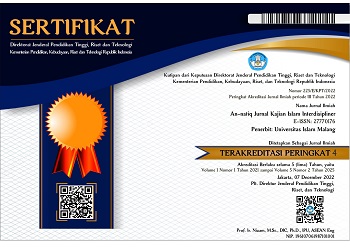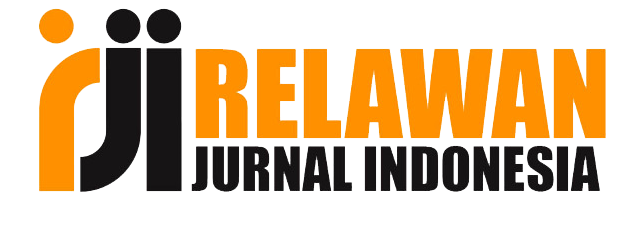GREEN HALAL: SINERGI INDUSTRI HALAL DAN PEMBANGUNAN BERKELANJUTAN
DOI:
https://doi.org/10.33474/an-natiq.v4i2.21491Abstract
The Halal industry and sustainable development are two progressive issues closely related in the future. Industrial practices, particularly in the food industry, generate a significant amount of waste, and consumer awareness of environmental issues has sparked interest in "green halal" products that combine environmental principles and halal requirements. This research aims to define Green Halal, explore the synergy between the halal industry and sustainable development across various sectors, and identify the challenges and obstacles in implementing the concept of Green Halal. Using a literature review approach and analyzed descriptively, the results show that the synergy between the halal industry and the green economy supports human and environmental well-being. Challenges involve supplier awareness, supply chain collaboration, government regulations, and community support. It is noted that there is limited research on Green Halal in the pharmaceutical and fashion sectors, while the food and tourism sectors have received more attention. The synergy of Green Halal is expected to provide high-quality, environmentally friendly, and safe products for all living beings and promote a balance between humans and the natural ecosystem.
References
Abdullah, R., Sabar, R., & Mustafar, M. (2018). Green Halal supply chain in Malaysian halal food companies: A conceptual framework. International Journal of Supply Chain Management, 7(5), 502–510.
Ambali, A. R., & Bakar, A. N. (2014). People’s awareness on halal foods and products: Potential issues for policy-makers. Procedia-Social and Behavioral Sciences, 121, 3–25.
Arifin, S. (2022). Pengaruh halal green packaging, green halal product, halal green perceived value Terhadap green purchase intention. Jurnal Ilmiah Ekonomi Islam, 8(2), 1411–1424.
Bux, C., Varese, E., Amicarelli, V., & Lombardi, M. (2022). Halal Food Sustainability between Certification and Blockchain: A Review. Sustainability, 14(4), 2152.
Falikhatun, F., Wahyuni, S., & Muthmainah, M. (2019). Green Halal Product: Upaya Peningkatan Destinasi Wisata Berbasis Syariah. Prosiding Konferensi Nasional Pengabdian Kepada Masyarakat Dan Corporate Social Responsibility (PKM-CSR), 2, 1041–1046.
Faridah, H. D. (2019). Sertifikasi halal di indonesia: Sejarah, perkembangan, dan implementasi. Journal of Halal Product and Research, 2(2), 68–78.
Hanapi, M. S., & Khairuldin, W. (2017). The Halal-Green in Al-Qur’an: A conceptual analysis. International Journal of Academic Research in Business and Social Sciences, 7(10), 2222–6990.
Hasanah, H., & Suprianik, S. (2022). Green Economy Dan Halal Economy Kolaborasi Solutif Menjawab Tantangan Ekonomi Global. Jurnal Pemikiran Penelitian Ekonomi, 10(02), 98–103.
Ibrahim, I., Rahmat, A. K., Fadhiha Mokhtar, N., Amer, A., Halin, I. A., & Ratna Masrom, N. (2020). A Conceptual Framework of Halal Green Supply Chain Management (HGSCM). 2020 11th IEEE Control and System Graduate Research Colloquium (ICSGRC), 361–365. Shah Alam, Malaysia: IEEE. https://doi.org/10.1109/ICSGRC49013.2020.9232483
Irfany, M. I., Khairunnisa, Y., & Tieman, M. (2023). Factors influencing Muslim Generation Z consumers’ purchase intention of environmentally friendly halal cosmetic products. Journal of Islamic Marketing.
Karia, N., & Asaari, M. H. A. H. (2016). Halal business and sustainability: Strategies, resources and capabilities of halal third-party logistics (3PLs). Progress in Industrial Ecology, An International Journal, 10(2/3), 286. https://doi.org/10.1504/PIE.2016.082143
Khan, M. I., Haleem, A., & Khan, S. (2021). Examining the link between Halal supply chain management and sustainability. International Journal of Productivity and Performance Management, 71(7), 2793–2819. https://doi.org/10.1108/IJPPM-07-2019-0354
Nuhoff-Isakhanyan, G., Wubben, E. F., & Omta, S. W. F. (2016). Sustainability benefits and challenges of inter-organizational collaboration in Bio-Based business: A systematic literature review. Sustainability, 8(4), 307.
Pujayanti, D. A. (2020). Industri Halal sebagai Paradigma bagi Sustainable Development Goals di Era Revolusi Industri 4.0. Youth & Islamic Economic Journal, 1(01), 20–33.
Rejeb, A., Rejeb, K., & Zailani, S. (2021). Are Halal Food Supply Chains Sustainable: A Review And Bibliometric Analysis. Journal of Foodservice Business Research, 24(5), 554–595. https://doi.org/10.1080/15378020.2021.1883214
Sachs, J. D., Schmidt-Traub, G., Mazzucato, M., Messner, D., Nakicenovic, N., & Rockström, J. (2019). Six transformations to achieve the sustainable development goals. Nature Sustainability, 2(9), 805–814.
Salaheldeen, M., Battour, M., & Nazri, M. A. (2019). Halal entrepreneurship and its role in sustainable development goals 2030 (SDGs). International Conference on Dakwah and Islamic Management (IC-DAIM 2019) Malaysia, 1–12.
Sapputra, N., & Hisyam, M. A. (2022). Penerapan Green Halal Tourism Dalam Tinjauan Hukum Islam dan UU Kepariwisataan NO. 10 Tahun 2009 di Ponpes Darul Ittihad Kabupaten Bangkalan. Prosiding Seminar Nasional Hasil Penelitian Dan Pengabdian Kepada Masyarakat, 1(1), 203–209. Retrieved from https://seminar.ustjogja.ac.id/index.php/semnas_LP2M_UST/article/view/621
Saputri, O. B. (2020). Pemetaan potensi indonesia sebagai pusat industri halal dunia. Jurnal Masharif Al-Syariah: Jurnal Ekonomi Dan Perbankan Syariah, 5(2).
Sarasi, V., & Helmi, A. (2019). Mengelola supply chain halal di indonesia. Jurnal Ekonomi Dan Bisnis Islam, 9(4), 47–56.
Setiawan, F. (2023). Pengembangan Green Halal Tourism dengan Metode Soar dan Analytical Hierarchy Process. Jurnal Ilmiah Ekonomi Islam, 9(1), 684–696.
Suherlan, A. (2023). DOES HALAL TOURISM SUSTAINABLE? A NARRATIVE LITERATURE REVIEW. Proceedings of the International Conference of Islamic Economics and Business (ICONIES), 9(1), 1021–1040.
Widyastutia, S., Parenrengib, S., & Tuzzaharac, F. (2019). Crafting green halal tourism: Enhancing the nation’s competitiveness. International Journal of Innovation, Creativity and Change, 8(11), 210–226.
Yuliantini, T., Soelton, M., Imaningsih, E. S., Karyatun, S., Ali, A. J., & Paijan, P. (2022). Green halal products: Family sme’s opportunity. ICCD, 4(1), 226–231.
Zakariah, H., Muhamed, A. A., Halif, M. M., Chairdino, A., Leuveano, M. Z. R., & Muhamed, A. (2023). Green Business Practices and the Success of Malaysia’s Halal Food Companies. Journal of Academic Research in Business and Social Sciences, 13(1), 272–285.
Downloads
Published
How to Cite
Issue
Section
License
Copyright (c) 2024 An-natiq Jurnal Kajian Islam Interdisipliner

This work is licensed under a Creative Commons Attribution-NonCommercial-ShareAlike 4.0 International License.


























